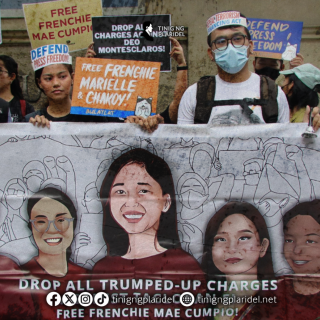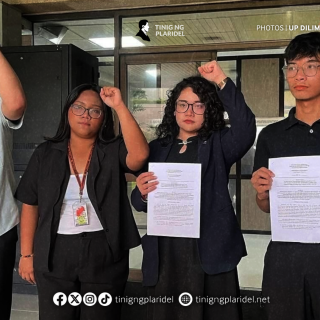The divided stance on abstentions among candidates in the University Student Council (USC) special elections has sparked debates within students over whether to keep or remove the option from voters’ ballots.
During the #CSiyasat2024 elections forum held on Oct. 22 at the University of the Philippines Diliman (UPD) College of Science (CS), candidates were asked about their stances on the removal of the abstain option in the elections. The surge in abstain votes last May prompted Diliman to hold a special election this October.
Among those who agreed with reservations to remove abstain were USC chairperson candidate Andrew Ronquillo, vice chairperson candidate Ron Dexter Clemente, and councilor candidates Joaquin Buenaflor and Olivia Herrera. In addition, councilor candidates Ramon Christian Placido and Aimee Denise Ramos also expressed agreement with the measure.
In contrast, four other candidates opposed to excluding abstain, namely USC chairperson candidate Sean Kirby Latorre, vice chairperson candidates Franz Joseph Beltran and Therese Jan Mangussad, and councilor candidate Kristian Martin Mendoza.
Chairperson candidate Latorre said that abstain is a “valid vote … a reflection of the state of the student movement now,” in a message exchange with Tinig ng Plaridel (TNP).
“When abstain dominated the past regular elections, maraming factors tayong nakikita that led to this: lack of confidence sa candidates, treating abstain as a protest vote, or merely apathy,” he added.
Meanwhile, USC chairperson candidate Ronquillo shared in an X (formerly Twitter) post that abstaining “essentially leaves no contingency for the continuation of a student council.” He also suggested having a “counter-proposal [to] uphold democratic participation” if the option is removed.
The discussion on abstain voting traces back to the 2016 University Student Electoral Tribunal (USET) ruling on Juan Paolo Artiaga when he was proclaimed as the College of Law representative to the USC despite abstentions prevailed.
Although Artiaga’s proclamation was later deemed “null and void,” the University Student Electoral Board (USEB) cited a precedent from the case of Joanne Lim, former CS representative, when she was also declared a winner in 2015 albeit abstentions garnering more votes.
Debates on abstain voting resurfaced this year after abstentions dominated in the last two regular elections. The 2024 polls resulted in historic vacancies across all university-wide SC seats. Just a year prior, the standard bearer candidates from UP Alyansa ng mga Mag-aaral para sa Panlipunang Katwiran at Kaunlaran (UP ALYANSA) also lost to abstain.
Despite abstain votes leading in several election cycles, USC’s Constitution and the Revised Student’s Electoral Code lack explicit provisions on abstain voting. Only Article 6, Sec. 2(b) states that USEB must conduct special elections if students “fail to elect” a representative, but this clause applies solely to college reps.
The absence of a clear-cut provision on abstentions challenged the USEB after abstain votes surpassed those for UP Alyansa candidates in 2023. Ultimately, USEB recognized the majority of active abstention and “declare the candidates superseded by abstentions as valid, elective representatives of the student body.”
Not only Diliman’s dilemma
Abstain votes overwhelming student council elections also hound other UP constituent units.
In 2018, UP Manila (UPM) also saw abstentions outvoting the standard bearer candidates in both the regular and the special poll held afterward—the first by-elections conducted in the campus.
That same year, UPM’s University Electoral Board (UEB) introduced the 50% + 1 ruling for councilor candidates, according to a Manila Collegian (MKule) report. Previous SC elections had followed the plurality method, where the candidate with the most votes would be proclaimed.
Described by various UPM student formations as an “illegal and unconstitutional” ruling, five councilor candidates lost their election bids. This comes after the UEB and political parties’ campaign managers “agreed” on the method.
Despite protests and the lack of “due and enough student consultations,” the abstain vote and majority ruling were institutionalized through including its provisions in the UPM Ratified Electoral Code by the UPM USC for the academic year 2018-2019.
Consultations were held among local colleges in the last two years in an attempt to remove the abstain option, but the provision was retained.
UP Los Baños (UPLB) also saw abstain votes winning over candidates running in college and university-wide student council elections.
But in an approved motion of the Council of Student Leaders (CSL) in 2019, a candidate outvoted by abstention can still be proclaimed, but they must appear before the CSL to be “scrutinized” and to “decide whether the candidate is worthy of a seat.” The CSL serves as the consultative arm of the UPLB USC.
Meanwhile, abstain voting will no longer be available as an option in the next general election of UP Mindanao, their university’s electoral board announced on Oct. 21.
Retain or remove?
As in other UP campuses, a campaign to eliminate the abstain option from the ballot in Diliman is likely to face resistance with the community divided on the proposal. As early as now, some students and past USC officers have voiced their opposition to the said measure.
The existence of abstain voting “respects voter’s autonomy, and democratic rights. Removal of such is a violation of that right,” Steve Vega, a UPD student, argued in an X post.
Likewise, former USC councilor Katrina Batac, said that excluding abstention “would still echo an anti[-]democratic election” if based solely on the urgency of student representation.
“[F]or the average unorganized student, there are high chances na ‘di sila immersed sa mga isyu na labas sa student[-]related concerns. [W]e end up missing primary steps if our goal is to organize students against larger campaigns … to put it simply, do you really think a student will be open to organizing if the leaders behind these initiatives are people they were simply forced to vote for?” she added in a separate post.
However, the Congress of Teachers/Educators for Nationalism and Democracy (CONTEND) said that voting abstain is a “step-backward” for student representation, in a statement.
“[A]ctively abstaining is not merely missing the opportunity to effectively create a counter-hegemonic bloc against the ruling administration, but it is a step backward in our on-going struggle for academic freedom and student representation,” CONTEND further stated.
The UPD USC has been inactive since the start of the academic year due to vacancies amid the impending budget cuts, opening of DiliMall, and state forces entering the campus. The incoming SC will have a heavy task ahead in rebuilding the council itself and reengaging students into their campaigns.
In an interview with TNP, some students said they were unsatisfied with the platforms the candidates presented during the campaign as a reason for abstaining in the last election. What also made choosing leaders “difficult” for some voters was their “unawareness” of the candidates and their platforms.
Ultimately, student leaders must work on regaining their constituents’ trust, and at the same time confront how abstentions “affect” student representation, said 40th UP Student Regent Iya Trinidad in a tweet.
“It remains a challenge then for student leaders to prove why they should be trusted by their constituents. And in the long term, let us collectively look at [and] understand how abstaining in the ballots affects genuine student representation,” said Trinidad.









